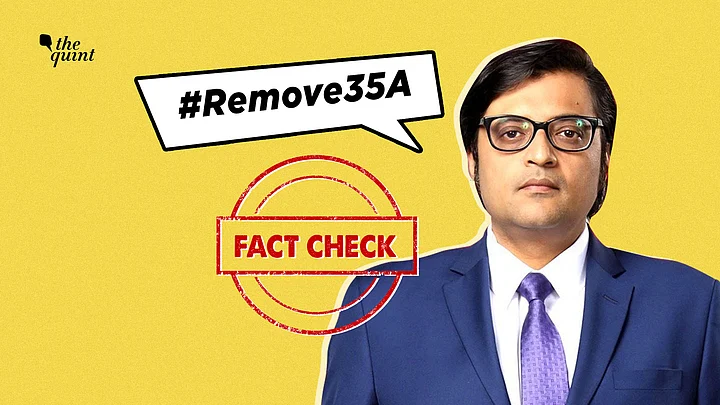On 26 July, Union Home Ministry deployed 10,000 paramilitary forces in Jammu and Kashmir leaving the people of the valley puzzled. The deployment that came after National Security Adviser Ajit Doval’s visit, caused panic with speculations on the rife that the Centre was abrogating Article 35A.
Former Jammu and Kashmir Chief Minister Mehbooba Mufti warned the central government against revocation of Article 35A, which allows the state’s legislature to define “permanent resident” of the state, saying any tinkering with the provision would be akin to setting a powder keg on fire.
While there was a sense of fear among the people, senior journalist and the Managing Director of Republic TV Arnab Goswami hosted a prime time debate arguing “Article 35A was a temporary provision” and that its abrogation wasn’t even a matter of debate.
Too caught up to read? Listen to the story here:
Goswami then went on to enlist a few questions justifying his rationale behind why Article 35A should be removed.
One of the questions that he raised was that shouldn’t a soldier “risking his life to safeguard the state from Pakistanis” not be allowed to buy property in the state?
This, as per Goswami, was a pertinent question. But is Jammu and Kashmir the only state that forbids people from buying land? Is that even a valid argument against Article 35A?
Nagaland, HP Among Other States Forbid Indians From Buying Land
While Goswami was absolutely right when he said that one can’t buy land in Jammu and Kashmir because Article 35A restricts an “outsider” from owning property or getting a state job in the state. But what he failed to mention was that Jammu and Kashmir isn’t the only state to have a restriction like that.
Many other states, Himachal Pradesh, Arunachal Pradesh, Nagaland, Sikkim among others don’t allow Indian citizens to buy land/property.
For instance, under Section 118 of the Tenancy and Land Reforms Act, 1972, outsiders can’t buy land in Himachal Pradesh. This was done to protect scarce land in Himachal from being purchased by outsiders. Similarly, under Article 371F of the Constitution, only Sikkimese residents can purchase land or property in the state.
Dispelling this notion about Jammu and Kashmir, the then Prime Minister Jawaharlal Nehru in 1963, said in the Lok Sabha that this rule (of outsiders not buying land) was good and should continue to discourage “moneyed people” from buying land.
“That is an old rule coming on, not a new thing, and I think that it is a very good rule which should continue, because Kashmir is such a delectable place that moneyed people will buy up all the land there to the misfortune of the people who live there; that is the real reason and that reason has applied ever since British times and for one hundred years or more.”Jawaharlal Nehru, Former Prime Minister
While purchase of land of one point raised by Goswami, he also spoke about how the debate around abrogation of Article 35A was unnecessary as it was a “temporary provision”.
Was Article 35A Temporary and Can It Be Revoked Unilaterally?
“35A is a temporary provision. The abrogation of 35A is not even a matter of debate,” Goswami said during his prime time debate adding that just like “Article 370, 35A has to go”.
But to understand this better, one has to understand that Article 35A was inserted by the president by an order under Article 370 in 1954. This means that the parliamentary route was bypassed.
However, speaking to The Quint author Ashok Pandey said,
“Article 35A was never a temporary provision. Article 370 was but that was also first passed by the Constituent Assembly of India and then ratified by Assembly of Kashmir and is no longer temporary, J&K High Court has accepted it as a permanent part of our constitution.”Ashok Pandey, Author, Kashmirnama
Article 35A was passed following the Delhi Agreement in 1952 between Nehru and the then Prime Minister of Jammu and Kashmir Sheikh Abdullah. And it was then agreed upon that the ‘State Legislature shall have power to define and regulate the rights and privileges of the permanent residents of the state’.
Historian AG Norrani, in an article titled ‘What Article 35A implies’ dated 29 March, 2019, thus argues that Article 35A can’t be “altered unilaterally”.
Noorani goes on to write that Article 35A was inserted on the “explicit recommendation of Kashmir’s Constituent Assembly” and the president can’t delete it because the Assembly is gone.
“Without its concurrence, Article 35A can neither be amended nor deleted. The other “special provisions” were enacted by Parliament as amendments to the Constitution. Will Parliament dare to repeal them? Article 35A cannot be amended or deleted by Parliament,” writes Noorani.
(Not convinced of a post or information you came across online and want it verified? Send us the details on Whatsapp at 9643651818, or e-mail it to us at webqoof@thequint.com and we'll fact-check it for you. You can also read all our fact-checked stories here.)
(At The Quint, we question everything. Play an active role in shaping our journalism by becoming a member today.)
